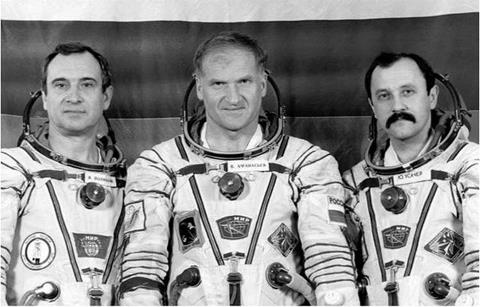. SOYUZ TM18
Flight Crew
AFANASYEV, Viktor Mikhailovich, 45, Russian Air Force, 2nd mission Previous mission: Soyuz TM11/Mir EO-8 (1990)
USACHEV, Yuri Vladimirovich, 36, civilian NPO Energiya, flight engineer POLYAKOV, Valery Vladimirovich, 51, civilian, cosmonaut researcher, 2nd mission
Previous mission: Soyuz TM6/Mir EO-3/4 (1988)
Flight Log
The launch of TM18 had been delayed due to the unavailability of the more powerful Soyuz U launch vehicle to lift the three-man crew. The flight of Polyakov was a logical step in the Russian quest for long-duration space flight experience and medical data. When Polyakov devised the programme for a second space flight, he aimed for an 18-month duration, but delays forced him to curtail the duration to 14 months, as he could not remain aboard Mir when the first NASA astronaut arrived on the station, which at the time was planned for early 1995. Though he carried out his own research programme, Polyakov still participated in other tasks, working with three different resident crews until his return in March 1995.
One of the first tasks on this mission was to relocate the Soyuz TM18 ferry from the aft port to the front port of the base block, which occurred on 24 January. During the short flight, the crew flew past the Kristall module and reported only minor scratches on its hull from where TM17 had struck it. Work for this resident crew was again limited by plans for the upcoming American docking missions, particularly the integration of Soyuz and Progress launches and amendments to subsequent
|
Record-breaker Polyakov (left) with the rest of the Soyuz TM18 crew, Afanasyev (centre) and Usachev |
resident crews to accommodate the joint programme with the Americans. At the time of Afanasyev and Usachev’s flight, this national and international coordination was difficult to implement, mainly due to the lack of funds, and soon the launch of the next resident crew had slipped from April to July. However, the EO-15 crew continued their research along the lines of previous resident crews, but also conducted medical and technical experiments sponsored by German institutes. Polyakov had also supplemented the science payload with smaller items brought up in his personal baggage on TM18.
In February, Sergei Krikalev was launched on the American Shuttle mission STS – 60, the first time that cosmonauts had been in space at the same time on different missions in spacecraft belonging to different nations. The following month, Progress M22 was also delayed for three days from 19 March when heavy snowfall at the launch site resulted in snow drifts covering the rail network to a depth of up to seven metres, making it impossible to move the spacecraft and its booster from the assembly building to the launch pad.
At the end of March, the cosmonauts on Mir participated in an experiment with a Swedish satellite called Freja, designed to study space plasma and magnetosphere physics in Earth’s magnetosphere and ionosphere. Launched in 1992 by the Chinese, Freja was located 1,770 km above the Alaskan coast when the crew of Mir, situated 383 km above the Pacific south of Alaska, fired an electron beam gun at it. At the time of the experiment, a Canadian ground station monitored the operation. Despite its scientific aim of determining how charged particle beams were scattered in the atmosphere, the media still reported the experiment as a test of Russian “Star Wars” weapons.
The difficulties that the post-Soviet Russia was undergoing were brought home to the cosmonauts aboard Mir in May, during unloading of the Progress M23 re-supply craft. They found that some of the food containers intended for the orbiting crew had been tampered with by ground staff, and items that should have been there were missing.
Milestones
166th manned space flight
77th Russian manned space flight
18th manned Mir mission
15th Mir resident crew
70th manned Soyuz mission
17th manned Soyuz TM mission
1st Mir resident mission without scheduled EVAs
Polyakov sets world endurance record for one flight of 437 days 17hrs, and a career record of 678 days 16hrs on two flights Polyakov celebrates his 52nd birthday in space (27 Apr)











